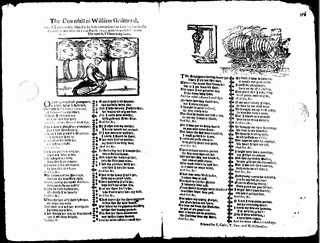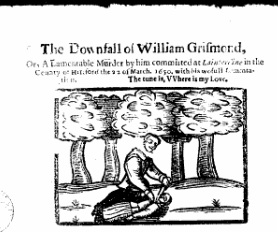 Wing / 2705:15 A recent post by author Eric Beetner on Holly West's blog has made me deeply reflect on the way I think about writing. Eric, a musician as well as a writer, was discussing the important role that music plays in his crime fiction. Eric uses music to add dimension to his characters, explaining "Music can be an effective way to get to know a character since music is very personal." We see this all the time in film, especially to set a mood, but I'm not sure how common this is in novels. But as I thought about it, I have used music to emphasize key themes in my writing, but in a very different kind of way from what Eric describes. The murders in my first novel, A Murder at Rosamund's Gate, are largely described through ballads, broadsides and other penny pieces... which is how 17th century Londoners would have learned about crimes within their community. Murder was literally described in verse, sung by booksellers on street corners, in a sort of a half fictional, half truthful way. Take, for example, this 1660s ballad which I chose at random from the Early English Books--a large collection of penny press from the 16th to the 19th centuries. As always, the title provides a synopsis to the reader (or listener, as neighbors and friends would read these ballads out loud): The downfall of William Grismond: or, A lamentable murder by him committed at Lainterdine in the county of Hereford, the 22 of March, 1650, with his woful [sic] lamentation.  If you just look at the first part, you'll see the author specifies that the murder ballad should be sung to the tune of "Where is my love." (Ironic, of course, given that his love is lying on the ground, having been murdered at his hands. The audience would have gotten the joke). But the point is that the story wasn't meant to be just read, but sung according to a well known popular tune. Somewhere along the way we may have lost this connection between music and fiction-writing. Obviously, a lot of musicians are story-tellers, but I'm not sure how many novelists frame their stories musically.
So I'm curious...If you write, do you deliberately use music as a way to develop themes, characters, mood etc? If you are a reader, do you hear a soundtrack play as you read? Do you want to?
11 Comments
Matt
11/24/2012 10:29:39 am
What an interesting idea...to write (or read) with a soundtrack. Very cool to hear how music enters your story.
Reply
11/25/2012 02:16:17 am
Im glad my post made you think. This is great information too. I was very shallow in my thinking and said to Holly that of course music would not effect a historical writer since you can't go listen to the songs. How wrong I was. I love that you use music and drew out the original uses of it. It's so true that songs were a way to spread news and tell stories back then, but I'd never thought of it that way. Fascinating.
Reply
11/25/2012 02:50:52 am
I always use music to keep me in the headspace of my novels. Obviously, certain cds will be more completely attached to one novel or one character than others...and sometimes a new cd will open up a character or a part of the plot that one hadn't seen before.
Reply
Jaynes
11/26/2012 01:59:08 am
As Billy Joel says
Reply
Leave a Reply. |
Susanna CalkinsHistorian. Mystery writer. Researcher. Teacher. Occasional blogger. Categories
All
Archives
May 2023
|
 RSS Feed
RSS Feed